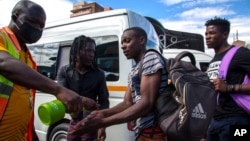As South Africa continues to ease coronavirus restrictions, technical and public health experts are working on plans to protect the health of the 14 million South Africans who rely on a network of minibus taxis to get to work, school and other destinations. Innovators and investors say this could be an African solution to a problem that affects millions of others in Africa, and beyond.
The humble minibus taxi is a lifeline for more than 70 percent of South Africa’s workforce. The informally regulated system of vans, each seating about 14 passengers, is a mainstay in the nation’s major cities and in its rural areas.
But health experts worry this system is a breeding ground for coronavirus because of riders’ close quarters and the high volume of passengers.
A new South African non-profit initiative, led by businessman Andile Ramaphosa, who is also the eldest son of President Cyril Ramaphosa, is trying to address this gap as the nation attempts to revive its economy after more than nine weeks of strict lockdown, which started in March and has since eased off. He told VOA it is critical to deal with the transport issue for commuters.
“Lockdown worked in this country in terms of reducing the spread of COVID. And it worked because people were not going anywhere. And that was really great and allowed government to prepare and do all the things they needed to do. When we insisted, as business, and as South Africans, ‘let’s open this economy,’ by not dealing with the commute, we basically undid what was happening with lockdown. So if you deal with the transport sector, because COVID is a virus that moves through the transport sector, if you deal with that effectively, you can actually put in an artificial lockdown. So for us, we saw that, and said, ‘Great. We need to come up with solutions,’” Ramaphosa said.
HIV researcher Dr. Jenny Pfeiffer-Coetzee, founder and director of the African Potential Foundation, says her team has come up with several solutions, ranging from simple to complex.
“What we're looking at is a system very similar to what's been used in ambulances, and that is to adapt a UVC air filter that allows the airflow to be encouraged within the taxi using various fans within the filter. And it passes through the filter where it's then irradiated within a matter of seconds, and it’s then transmitted back into the taxi to be circulated out of the taxi,” Pfeiffer-Coetzee said.
Her team is also considering an alarm system that alerts passengers to open the windows to allow fresh air to circulate; sanitizing stations that passengers can use to clean their hands before boarding, and a divider between the driver and passengers.
These measures, says Ramaphosa’s team, could decrease the risk of infection by up to 80%. So far, the team's Supplier Development Initiative (SDI) has outfitted 5,000 school transport taxis and 1,000 commuter taxis, at an estimated cost of about $340,000. much of it provided by donors.
Ramaphosa says it’s been a steep learning curve, but a worthwhile one.
“It’s been quite a journey of discovery, for us non-scientists, to bring all these people together with one thing in mind: we need to get our people to work safely, and we need to save lives,” he said.
Pfeiffer-Coetzee said the team is also looking at how to scale the model up to fit other African countries, which use similar transport systems to move millions of people each day.




